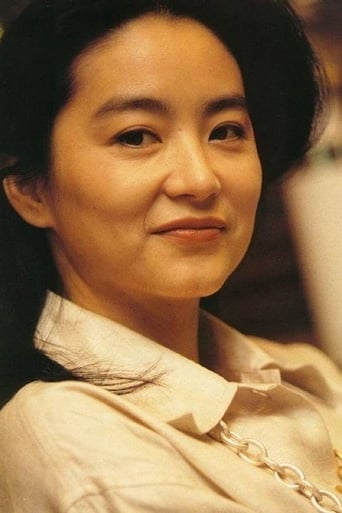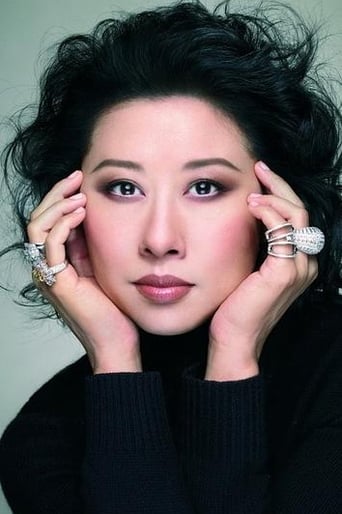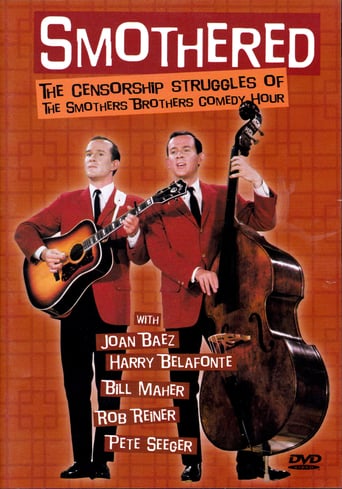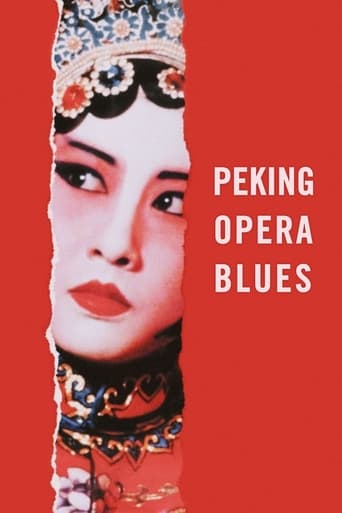
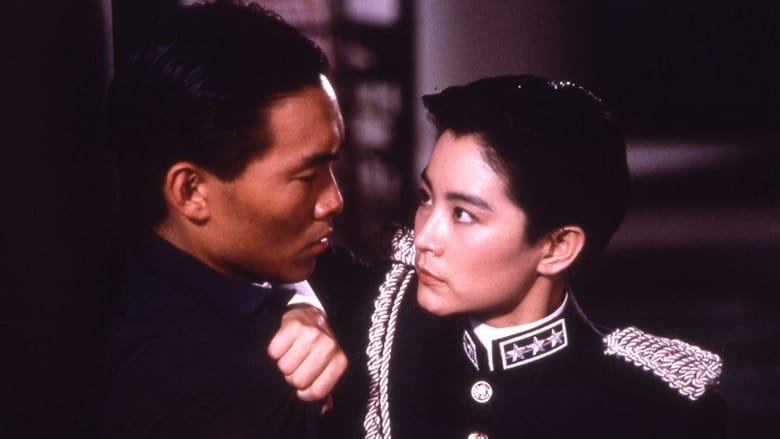
Peking Opera Blues (1986)
The film is set in 1913 Beijing, during Yuan Shikai's presidency of the Republic of China. It depicts the adventures of a team of unlikely heroines: Tsao Wan, a patriotic rebel who dresses as a man; Sheung Hung, a woman in search of a missing box of jewels; and Pat Neil, the daughter of a Peking Opera impresario.
Watch Trailer
Cast
Similar titles
Reviews
Sorry, this movie sucks
Fantastic!
Absolutely Fantastic
Although it has its amusing moments, in eneral the plot does not convince.
There is not much that I can really talk about this movie. It isn't one that addresses any really serious issues. All I can really do is give one a quick run down on what it is about and some of the more interesting points in regard to it. Des Mangan, one of SBS's reviewers, absolutely loves this movie (he said so before hand) and puts it down as a cult movie. I don't think that it deserves Cult status, and has not become apart of my collection, but it is still a reasonable movie.Peking Opera Blues is a Hong Kong movie set in 1913 during the beginning of the Chinese Republic. It is set in a town, Peiping or something like that, in South China. The current general is bankrupt and flees because he cannot pay his guards. Then a new general moves in who is involved in a conspiracy to turn South China into a military dictatorship, and his daughter is determined to stop it. Being caught up in this conspiracy is the daughter of a theatre owner, a guard who is about to be killed by his comrades, and a maid from the previous general who is trying to find the jewels she stool.The movie seems to offer the possibility of some fight scenes, but in the end there are not that many. The only cool scene was when the guard was wielding four bolt action rifles at once and shooting all of the other guards in the corridor. There seemed to be potential for fantastic martial arts, but that never really arose. The end was promised to be a bonanza, but that never really eventuated either.I can't really think of anything else that I can describe within this movie. There is no really overriding theme, though there is the possibility of women's rights. The women in the movie all seem to be resentful of male dominance: one wants to be an actor but can't because she is a woman, while the general's daughter cuts her hair short to symbolise her desire to be more of a man. The male heroes in the movie are sort out by the girls, and it is the girls who lose out when both of them are taken. In fact the movie seems to move more from the view of the women than the men - the men are what would be the love interests in typical American movies (and Hong Kong movies as well).I guess this movie wasn't all that bad. There was a lot of untouched potential, and I was never actually board during it. It was interesting enough to keep my attention for the duration. The action scenes weren't fantastic but they were enough to hold me for a while.
First I should mention that I enjoy watching films from Hong Kong. Even so, I didn't find out about Peking Opera Blues for some time. Sure I've seen another popular film by director Tsui Hark; the excellent Once Upon A Time In China. But the reason I didn't get to watch Peking Opera Blues earlier is because it's not easy to find. It's not readily available online or in video stores like other Hong Kong films, and it wasn't available at my local library. After that, having read reviews about how good the film is I decided to find it. It was available at the city library so I headed there and checked out the DVD. The opening of the film is reminiscent of the opening from Once Upon A Time In China. It contains shots of Peking Opera performers along with their accessories, and it's aided by a catchy song in Cantonese. I knew then that I was in for something special. The film is set in 1913 Beijing, during Yuan Shikai's presidency of the Republic of China. It depicts the adventures of three unlikely heroines: Tsao Wan (Brigitte Lin), a patriotic rebel who dresses as a man; Sheung Hung (Cherie Chung), a musician in search of a missing box of jewels; and Pat Neil (Sally Yeh), the daughter of a Peking Opera impresario. What the viewer should expect is that Peking Opera Blues is a slapstick comedy. The plot is simply there for the three women to get into comical and sometimes dangerous situations. However, the film also offers some fast and breathtaking fight scenes, along with several shootouts. These alone don't make an excellent film however. What sets Peking Opera Blues apart from other Hong Kong releases is its style and the three female leads. For once we get to see women generate humor and duke it out with the bad guys. This is the film's charm. Did I mention that the actresses are beautiful? I especially liked Sally Yeh in the role of Pat Neil. She's the most righteous of the three women. She also gets to perform in the opera during one important scene. American film director Quentin Tarantino once referred to Peking Opera Blues as "one of the craziest movies ever made" and "the best and a lot of fun." That statement pretty much sums it up. Those people who like Hong Kong cinema will like this film. Even those who don't usually watch foreign films may like it as well. Peking Opera Blues is a modern classic of Hong Kong cinema.
absolutely perfect film-making in a way that storytelling here is of foremost interest and not just great shots and cinematography like overrated Wong Kar Wai and Zhang Yimou used to do. This film beautifully depicting characteristic traits of China like its values, culture and principles and cleverly Tsui Hark let this clashed with politics, authority and government - which the last lyrical image of the laughing Peking Opera actor beautifully addressing to that political institutions are very transient but not Chinese valuable roots and traditions.Sure, it's not evidently among Tsui Hark's bigger masterpieces like "Seven Swords" or "Once Upon A Time In China", but yet i think this surely should be compared to those greatest classics in the world but it's very difficult when a lot of people can't respect and understand Chinese traditions, so what we now have here is a tremendously underrated masterpiece that should be studied in the years to come, because is very inspirational how to tell a story in a visual way. Peking Opera Blues is the perfect paradigm.I'll never forget this truly great film.
In Peking Opera Blues, director Tsui Hark takes us back to 1913 China: daughter of the general Tsao-Wan [Lin Ching Hsia] is torn between the love for her father, who plans to secure a loan from the Europeans in order to aid president Yuan, and the support for a rebellious group, who see in Yuan's leadership a peril for the republic and therefore plan to unmask him by stealing the loan papers and handing them to the congress.The movie follows the deeds of three women, different by social class (one is daughter of the general, another one a greedy street musician whose goal is to get rich and leave China, the third one a theatre performer - or, more precisely, an aspiring theatre performer, as acting at the time was only allowed to men) and, yet, put together by Fate. As the three eventually join forces, we get to see a lot of colorful Peking Opera performing, as well as amusing and endearing situations. The movie, indeed, deals with the problems of mutual trust and loyalty, especially in those situations when the ideals come to clash against the personal ambitions.The only aspect of the movie I was a bit put off by is the ease with which the group is always able to escape the most dangerous situations. Even the hardest-to-die Bruce Willis would have been puzzled on how to leave the mansion... and Spiderman himself would need more than one try to leap successfully from a mansion to the top of a tower! Apart from this, Peking Opera Blues is a beautiful movie, more over enriched by a gripping soundtrack, dazzling theatre choreography and, most of all, an intense story that is sure to make you smile with joy at some moments and shiver with terror in other circumstances. 8/10
